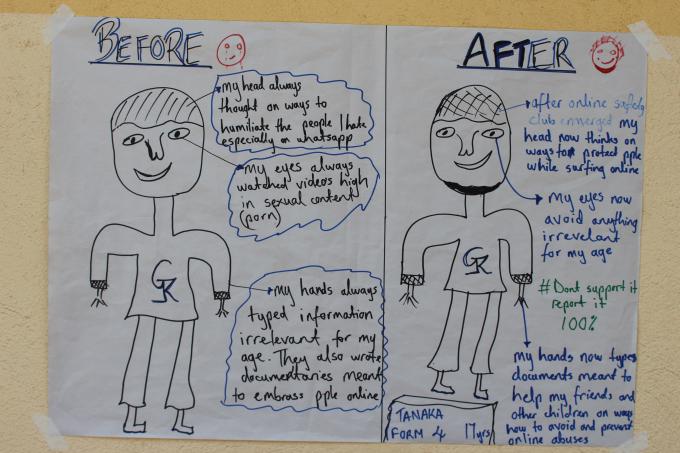Children's Online Safety a priority in Zimbabwe
Save the Children in partnership with the Ministry of Primary and Secondary Education and the Zimbabwe Republic Police (ZRP) Victim Friendly Unit is implementing the Children’s Online Safety Project in 10 Secondary Schools located in Harare the capital city of Zimbabwe. The project which targets children between 12 to 18 years, aims to build children’s online resilience through providing them with knowledge on positive use of the internet and risks associated with using the internet such as cyber bullying, revenge pornography, sexting, identity theft and many others.
Trainings on online safety were conducted for teachers and students in the 10 secondary schools leading to the establishment of Online Safety Clubs in each school. The Online Safety Clubs consist of students and they play a role of raising awareness on online safety to other children and adults using various ways such as dramas, debate, presentations, poems and songs. They also assist other children who have been abused online by directing them to responsible authorities who can help them such as teachers or police.
Kudzai, an Online Safety club member at Harare High School says that the project changed her behaviour online and she is now able to educate her peers on the importance of staying safe online. “The project has really made a positive impact in my life and I’m sure my peers share the same sentiments. I used to bully others online and I did not care how they felt. The trainings I got on online safety have made me realise I was doing a terrible thing because online abuse can affect an individual to the extent of committing suicide. I used to visit unsafe sites and by this, I was risking my own security. I am happy that I am now able to educate my peers at school and in my community about how to stay safe when going online and the importance of using the internet positively.”
Save the Children also built the capacity of ZRP Victim Friendly Unit and this has enabled them to set up response mechanisms for investigating and managing online abuse of children. The Online Safety Club Members’ work directly with the Victim Friendly Unit and this has enabled children to have direct access to the police and get advice on how and where to report among other issues. “Some cases of online abuse go unreported because children are afraid of the police. However, working with the Victim Friendly Unit has enabled us to have a good and open relationship with the police and we have managed to take up issues from our peers who have been abused online but fear to report the cases.” says Natalie a student at Seke 1 High School in Harare.
Tendai Ruvaro, a teacher at Seke 1 High School highlighted that the project has been a success as the school now has a few cases of online abuse being reported and the school has managed to come up with measures to protect children online. “Before the project was introduced, different cases of online abuse were reported to the school office. We had an incident where a 14 year- old girl from Seke Community, committed suicide after her nude pictures were leaked on social media. Perhaps such incidences occur because some children had no knowledge, and went on to abuse others online without knowing that it was wrong. However, we barely receive complaints from children as they now have knowledge about how to stay safe when surfing as well as avoiding to violate the rights of other children. The Online Safety Club is also doing commendable work in raising awareness about Online Safety at school and in the community. As a school we also came up with mechanisms to protect our children when they are using the internet at school by blocking all site which are not educational and we also encourage parents to monitor their children’s use of the internet at home.”
With so much social interactions taking place from behind a mobile phone and computer screen, young people are likely to become victims of online abuse such as cyber bullying, sexting and revenge pornography hence the Online Safety Project has proved to be an effective intervention seeking to protect children each time they go online.
 Zimbabwe
Zimbabwe 